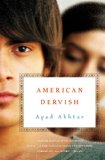Summary | Excerpt | Reading Guide | Reviews | Beyond the Book | Readalikes | Genres & Themes | Author Bio

Critics' Opinion:
Readers' Opinion:
First Published:
Jan 2012, 368 pages
Paperback:
Sep 2012, 384 pages
 Book Reviewed by:
Book Reviewed by:
Megan Shaffer
Buy This Book
It was where Rachel sat.
Professor Edelstein looked fresh and formal in a variation on his usual pastel medley: an impeccably pressed mauve oxford, topped and tightened at the neck by a rose-pink bow tie, and suspenders matching the auburn shade of newly polished penny loafers.
He greeted me with a warm smile as I entered. "Hey, Hayat."
"Hi, Professor."
I wove my way through the desks to the corner where I usually sat, and where lovely Rachel was munching on a cookie.
"Hey."
"Hey there."
"How was the game?"
"Good."
She nodded, the corners of her lips curling coyly upward as she held my gaze. It was looks like this - her bright blue eyes sparkling - that had made me hazard the invitation to the game the night prior. I'd been wanting to ask her out on a date all semester. But when I'd finally gotten up the courage, she'd told me she had to study.
"You want some?" she asked. "It's oatmeal raisin."
"Sure."
She broke off a piece and handed it to me. "You do the reading for today?" she asked.
"Didn't need to."
"Why not?"
"I already know the chapters he wanted us to read... by heart."
"You do?" Rachel's eyes widened with surprise.
"I grew up memorizing that stuff," I explained. "It's a whole production some Muslim kids go through. You memorize the Quran... They call it being a hafiz."
"Really?" She was impressed.
I shrugged. "Not that I remember much of it anymore. But I happen to remember the chapters he assigned for today..."
At the front of the class, Edelstein started to speak. "I trust you've all done your reading," he began. "It's not ground we're going to cover today, but it's obviously important material. I'd like you guys to keep moving. The Quran can be slow going, and the more of it we get through this semester, the better." He paused and arranged the papers gathered before him. Rachel offered me the rest of her oatmeal cookie with a whisper:
"Wanna finish?"
"Absolutely," I said, taking it.
"Today, I'd like to share some of the recent work a couple of my colleagues in Germany are doing. I wasn't able to offer you any readings on their work, because it's very much happening right now. It's at the very forefront of Islamic scholarship..." Edelstein paused again, now making eye contact with the Muslim-born students in the class - there were three of us - and added cautiously, "And what I have to share may come as a shock to some of you."
So began his lecture on the Sanaa manuscripts.
In 1972, while restoring an ancient mosque in Sanaa, Yemen, a group of workers busy overhauling the original roof found a stash of parchments and damaged books buried in the rafters. It was a grave of sorts, the kind that Muslims - forbidden from burning the Quran - use to respectfully discard damaged or worn-out copies of the holy book. The workers packed the manuscripts into potato sacks, and they were locked away until one of Edelstein's close friends - a colleague - was approached some seven years later to take a look at the documents.
What he discovered was unprecedented: The parchment pages dated back to Islam's first two centuries, fragments of the oldest Qurans in existence. What was shocking, Edelstein told us, was that there were aberrations and deviations from the standard Quran that Muslims had been using for more than a thousand years. In short, Edelstein claimed, his German colleague was about to show the world that the bedrock Muslim belief in the Quran as the direct, unchanged, eternal word of God was a fiction. Muslims weren't going to be spared the fate of Christians and Jews over the past three centuries of scholarship: the Quran, like the Bible, would prove to be the historical document common sense dictated it had to be.
Up in the front row, one of the students - Ahmad, a Muslim - interrupted Edelstein's lecture, raising his hand angrily.
This excerpt is used with the permission of Little, Brown and Company. All rights reserved.




When you are growing up there are two institutional places that affect you most powerfully: the church, which ...
Click Here to find out who said this, as well as discovering other famous literary quotes!
Your guide toexceptional books
BookBrowse seeks out and recommends the best in contemporary fiction and nonfiction—books that not only engage and entertain but also deepen our understanding of ourselves and the world around us.